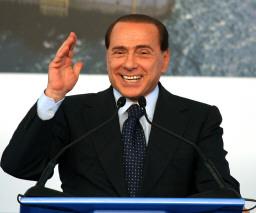A law granting immunity to Premier Silvio Berlusconi was challenged on constitutional grounds Friday in a trial into alleged irregularities in the purchase of film rights for his Mediaset media group.
The prosecutor claimed the July law which granted immunity to Italy's top four officials should be put to the Constitutional Court because, he said, it did not properly define ''high-ranking state officials'' in the body of the text but only in the title.
The prosecutor, Fabio De Pasquale, also argued that the new law had not resolved other issues which caused a previous incarnation to be shot down by the Constitutional Court four years ago.
The new law is known as the Alfano Law after the justice minister who framed it, Angelino Alfano. The previous one, known as the Maccanico Law, was passed in June 2003 and declared unconstitutional in January 2004.
The Alfano Law has been criticised by the centre-left opposition and legal experts, although the criticism has been more muted than in the case of the Maccanico Law.
This summer the Italy of Values (IDV) opposition party leader and ex-graftbuster Antonio Di Pietro lodged an official request for a public referendum on whether the law should be repealed.
''We need to know if Berlusconi is a rascal or if he is an upstanding person, and we need to know now - not after he has governed,'' Di Pietro said at the time.
The Alfano Law gives immunity to Italy's top four institutional figures - the president, the premier and the two parliamentary speakers - while in office.
Di Pietro and other opposition politicians claimed the law was tailor-made to help Berlusconi escape from two ongoing corruption trials, but the government says the measure brings Italy into line with other European countries.
The premier says it will end what he claims is politically motivated persecution by the judiciary.
The Mediaset case is one of two ongoing trials against Berlusconi which were widely expected to be automatically frozen by the Alfano Law.
In it, the premier and 11 others are accused of fraud over the film rights bought by Mediaset.
In the other trial, the prime minister is accused of paying British corporate lawyer David Mills a $600,000 bribe to stop allegedly incriminating evidence emerging in earlier trials.
In both trials, the defendants deny wrongdoing.
Berlusconi has called the Alfano Law ''the least a democracy could do in defence of its freedom''.
He said the law would put an end to the ''unacceptable persecution'' he has allegedly undergone since he first entered politics in 1994.









